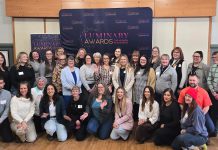Taking care of children is hard work and local parents feel isolated and overwhelmed, according to a recent study conducted by the Research for Social Change Lab (RSCL) at Trent University in Peterborough in partnership with Lakelands Public Health.
Last Tuesday (October 21), RSCL released Parenting Matters in Peterborough, the final report of the group’s “In Their Own Words: Parenting Work in Nogojiwanong/Peterborough” research study.
The report highlights the challenges that area parents face while raising children and provides evidence-based recommendations aimed at improving family wellbeing.
The report’s lead author, Trent University researcher Dr. Mary Anne Martin, shared her thoughts with kawarthaNOW about the most telling discovery findings of the report.
“We heard that parents are working really hard, but without adequate incomes, affordable child care, and accessible primary health care, they remain overwhelmed in trying to provide the safe, stable and nurturing environments that children need,” Dr. Martin said.
Drawing on more than 560 survey responses and the insights of 57 focus group participants, the research study set out to capture the realities of parenting in Peterborough. The vast majority of participants identified as women, despite targeted attempts by the researchers to encourage the participation of men in the focus groups.
The researchers gained insights into what families need, and the report offers an extensive set of recommendations for how the community can help support parents.
According to the report, while parenting is essential work that shapes children, families, and communities, it is often undervalued and unsupported. Parents in the community are working hard to keep themselves and their families well, but that not be enough to ensure the wellbeing of children.
Dr. Martin highlighted some of the systemic challenges parents face, including the high cost of living, issues with access to child care, and barriers to services such as primary health care.
Ultimately, parents are constantly stressed.
“In the survey, 51 per cent of parents reported they always or often felt stressed over the last six months,” said RSCL director Dr. Naomi Nichols in a media release announcing the report. “But parents also told us what they need to thrive. Their voices reveal the real conditions of parenting work in our city and the opportunities for positive change.”
Dr. Thomas Piggott, medical officer of health and CEO of Lakelands Public Health, said the findings illustrate the need for a collaborative community response to the issue of overwhelmed parents.
“Helping parents effectively requires cross-sector collaboration and upstream solutions,” Dr. Piggott said in a statement. “When communities, schools, health and social services, and government work together, we can reduce stress, build stronger families, and help children grow up healthy and safe.”
The report includes voices from parents in the City of Peterborough, Peterborough County, Curve Lake First Nation, and Hiawatha First Nation. A parent is defined as anyone who is a primary caregiver for a child, and a family “includes the breadth and diversity of household compositions that form structures of caregiving for a child.”
According to the report, the events, environments, and relationships that people experience, especially early in life when their brains and bodies are developing, can have a profound impact on their health and wellbeing over their lifetime.
“Both episodic and ongoing adverse experiences can cause chronic stress that keeps children’s nervous systems activated and unable to recover, potentially having serious impacts on how their bodies and brains develop,” the report states.
“As important people in children’s lives, parents and caregivers have the opportunity to interrupt the effects of adversity on children and promote resilience in their lives. To do this well, parents themselves need to be supported. While much is known about the impacts that children’s homes, communities, and society generally can have on their experiences of adversity and resilience, little empirical knowledge has been available regarding the experiences of parents, and more specifically, those in Peterborough.”
The study set out to change that, and researchers collected information aimed at understanding who is parenting children, what everyday parenting work entails, the factors that make parenting work harder, the conditions that make parenting easier, and more.
The purpose of the report is “to encourage decision-makers to use our findings to develop policies and invest in interventions that support safe, stable, and nurturing developmental contexts for children” and “inform a more equitable system of supports for children and families,” the researchers noted.
Along with Dr. Martin, the report’s co-authors are Trent University professor Dr. Naomi Nichols and public health nurses Kate Dunford and Kara Koteles, with contributions from others. The full report is available at www.socialchangelab.ca/in-their-own-words-final-report.
Founded at Trent University by Dr. Nichols in 2021, RSCL is a community-engaged research collective that aims to mobilize university resources for social change. With community partners, RSCL designs and executes research projects to generate actionable knowledge and creative problem-solving around issues such as homelessness, social exclusion, and poverty.



























